If you've been before then you will already know most of what I'll be writing about on this page. Some of my thoughts are applicable wherever and however you safari. My comments on accommodation are more focused on the tented campsites. I have stayed in hotel/lodge accommodation and for many people its probably a better option, especially those of you with children or those of a slightly nervous disposition.
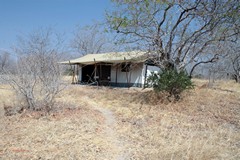
Guest tent in Ruaha. The tents are pitched
about 50 metres apart and only a short walk
from the large communal dining and
socializing tent
But for anyone wanting a much better experience of the African bush, and who wishes to feel closer to nature I would recommend a tented campsite; the further away from any other people the better.
There is no finer experience than waking up to hear the birds singing right outside, and then listen to the not so distant roars of the local lions as the dawn breaks, and possibly see some grazing animals or even elephants pretty close to you as you lay in bed.
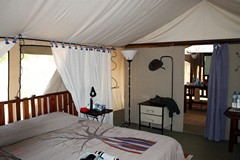
An inside view of the tent above. The
bathroom and shower are beyond the lilac
curtain near the back
The downside of this is that these decent campsites tend to be more expensive than the large tourist lodges.
So - what to pack specifically for a safari?
Mornings can be cold in many areas in Winter months, especially driving along in an open vehicle at 6:00am in the half dark, so bring a sweater or fleece and some long trousers. Long trousers are also a useful defence against biting insects if needed (not very often). You can soon do a quick change into shorts as the World heats up. You don't need big boots or anything unless a: you just want to look the part, or b: you are planning a walking safari. I get by perfectly well in a pair of boat shoes or trainers.
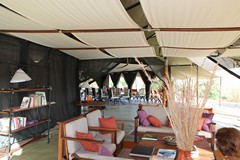
A communal tent with the dining area at the
back. It's customary to dine together in many
of the camps
Stick to earthy colours while out - khakis and olive greens, fawns and browns are good. It might not make a huge difference while in a car, but then again I believe it's better to blend in a little. And don't wear bright blue, unless you have an affinity for tsetse flies (although they aren't present everywhere). Once back in camp by all means wear the flourescent shirt bought in Barbados or where ever. Wear a sunhat while out and be careful, it's easy to get burnt arms and legs.
Take with you in the car: suncream, hand antiseptic,
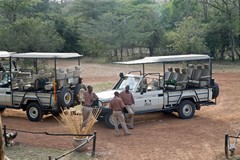
Open sided vehicles are best but we prefer
three rows of two seats as then nobody is
stuck in the middle if the car is full. Usually
there are only four passengers so it's not a
problem
bite cream, lip balm (it gets very dry when driving along) and maybe a tube of mints. DEET based insect spray. Also Citronella may help ward off tsetse flies.
Photography gear etc. I will assume you've already sorted that.
To me, open sided cars are far more preferable than closed Landrovers with pop up roofs. The one advantage I found with closed vehicles was that in heavily tsetse fly infested areas we could shut the roof and windows and drive through as
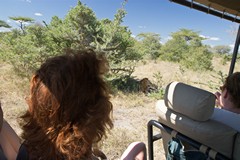
You can get very close to the wildlife. It
makes for some very exciting moments, and
great photography. Sometimes you just pray
that they don't move
quickly as possible until we were away from the bad patch. Tsetse flies tend to like areas of thick bush. Overall though it's no contest, open is more immersive and the airflow is better for keeping cool.
The immediate thought is - how close do we get to wildlife in these open vehicles? Well, pretty scarily close at times. We've had lions walk past at less than one metre, and elephants touch the car bonnet with their trunks. You have to trust in your guide, who will assess each group of animals you come across. Sometimes we've seen elephants behaving a little bit nervously and we had decided to stop at 100 metres. Similarly with
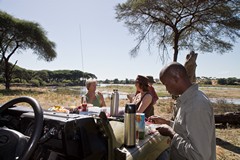
Bush breakfast on the bonnet is one of the
real joys of safari. The guides will check out a
safe place to stop so you can stretch your legs.
Here we were watching the elephants
crossing the river a little further downstream
grumpy lions - who are generally known to the guides - we've given them plenty of space. I've never heard of a serious incident happening to anyone out with a good knowledgeable guide. Generally if there are any incidents it turns out that the people did something stupid. So don't.
Depending on where you are, you may of may not be allowed off road. In a National park like Tarangire it's a no-no but in a Game Reserve such as Selous you can. Toilet facilities and picnic sites can by found in National parks, although they are few and far between.
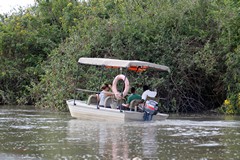
Boat trips are very relaxing, especially when
drifting with the engine off. And it gives a
different perspective on photography
(and hippos)
Generally I've been well impressed with their cleanliness. In Game Reserves the facilities are more likely to be a convenient bush. So get used to the idea and maybe stuff some loo roll in your bag. Of course the guide will check out the surrounding area before you get out.
Boat trips, if available, are a fabulously relaxing way to spend a few hours, especially at sunset as you get awesome photographic opportunities.
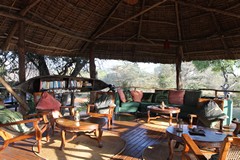
Another communal area, this time on a
raised platflorm with beautifully polished
wooden flooring
But don't trail your hand in the water (crocodiles) and do not get too close to hippos especially if they have babies with them.
Once back at camp you can relax and wear what you like. Camps generally don't have fences. Some have Maasai guards on duty day at night and some don't. It's pretty safe to stroll about during the day, but at night you will find you have an escort to and from the main dining tent.
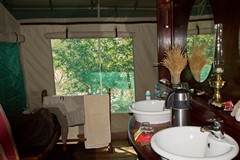
Well equipped bathroom area of the tent.
The loo and shower were behind it
We've sat around the camp fire and seen Impala, jackals and even a hyaena knocking about. Walking back to the tents after dinner there may be elephants around.
During the hours of darkness, if there are no guards, there could be lions and leopards strolling through the camp but as long as you stay zipped inside your tent they aren't interested in you. Most nights I'd say it's very very quiet and I get the best night's sleep ever.
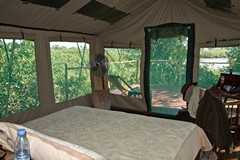
Looking out of the tent at the patio decking
and the river beyond. Closing the curtains over
the flyscreens at night is optional
Don't take food back to your tent - especially fruit. I heard and saw the results of a case of 'elephant smell banana, elephant get banana,' destroying the tent in the process.
The high end tented sites incorporate a bathroom, shower and a flushing loo into each tent. There is also some sort of electrical power, at least enough for some lighting and battery charging. Often hair driers aren't allowed though. You will need to research what type of mains adapter is needed for whichever countries you are visiting.
In case of power failure there are usually backup oil lamps available but it is sensible to keep a small torch at your beside overnight.
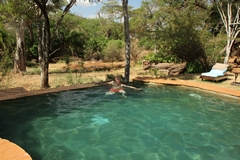
After lunch you get a few hours to relax in
the pool or check out batteries and look at
the morning's photos before setting off again
at around four pm until dark. There is often
game around to entertain you
Some things to keep in the tent are: Imodium (or something to stop diarrhoea), Dioralyte (rehydration fluids), Sudo Crem, and sticking plasters. Hopefully dudu (bug) spray is provided anyway.
Imodium and Dioralyte are absolute life savers, especially during the first couple of days if your stomach is complaining at the change of diet.
You need to keep the tent flap zipped right up. Obviously little bugs (wadudu) will try and get in through a bit of a gap. Usually you'll find your tent has a resident gecko who helps with the problem. We've never had any serious episodes with insects, maybe the odd ant or wasp but that's about it.
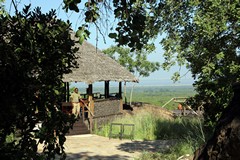
Friendly bar staff waiting to serve us a cold
beer after a morning's game drive. This
camp is on a hillside and has a commanding
view of Tarangire National Park from its
terrace
We've had hyraxes living under a raised tent, and monkeys bouncing off the roof from an overhanging tree.
We've been woken up by bloodcurdling screams just outside in the wee small hours, but once we found out they were just bush babies we quite looked forward to hearing them again.
Night safaris. If you get the chance to take one then I very much recommend it.
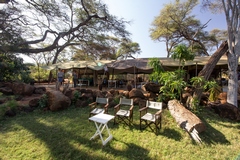
This beautiful camp is set under shady trees
on the banks of a small river. You could sit all
day just watching the birds and some of the
animals coming for a drink
There are all sorts of animals out at night that you may hardly ever see by day. Three I can think of are the aardwolf, the aardvark and the genet, all of which I've seen by the light of a lamp whilst out at night. Take a fleece though, depending on where and when you go. For instance it can get down to about 7 degrees C in Ruaha in June and July. However in October, which is the height of the dry season it may not drop below 25 degrees C in some places, such as Meru in Kenya.
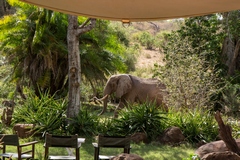
Sometimes you will share your camp with
other residents. This bull was a regular visitor
and as long as we didn't bother him he was
content to leave us alone
The staff all work very hard to make your stay pleasant. It is expected that you will leave a tip at the end of your stay, usually in US Dollars and there will be a staff tip box on display. They all take the mighty 'Greenback'. The guides also qualify for a reasonable tip. I did $20 per day for guides in 2018. A good tip encourages them to continue to give of their best.
Increasingly WiFi is becoming available in many camps. I feel that it's a bit of a double edged sword because a lot of the charm of a decent safari is that feeling of being out of touch with everyone - a taste of years gone by when people went for months without any contact with the ouside world. Letting go of the modern world is very relaxing. My advice would be to keep communications to the bare minimum and enjoy nature's own drumbeat
I've never had anything pinched from the tent, although a few monkeys have tried to get in at my breakfast biscuits. Additional overnight security is provided by the local lions completely free of charge. I assure you it is quite safe.